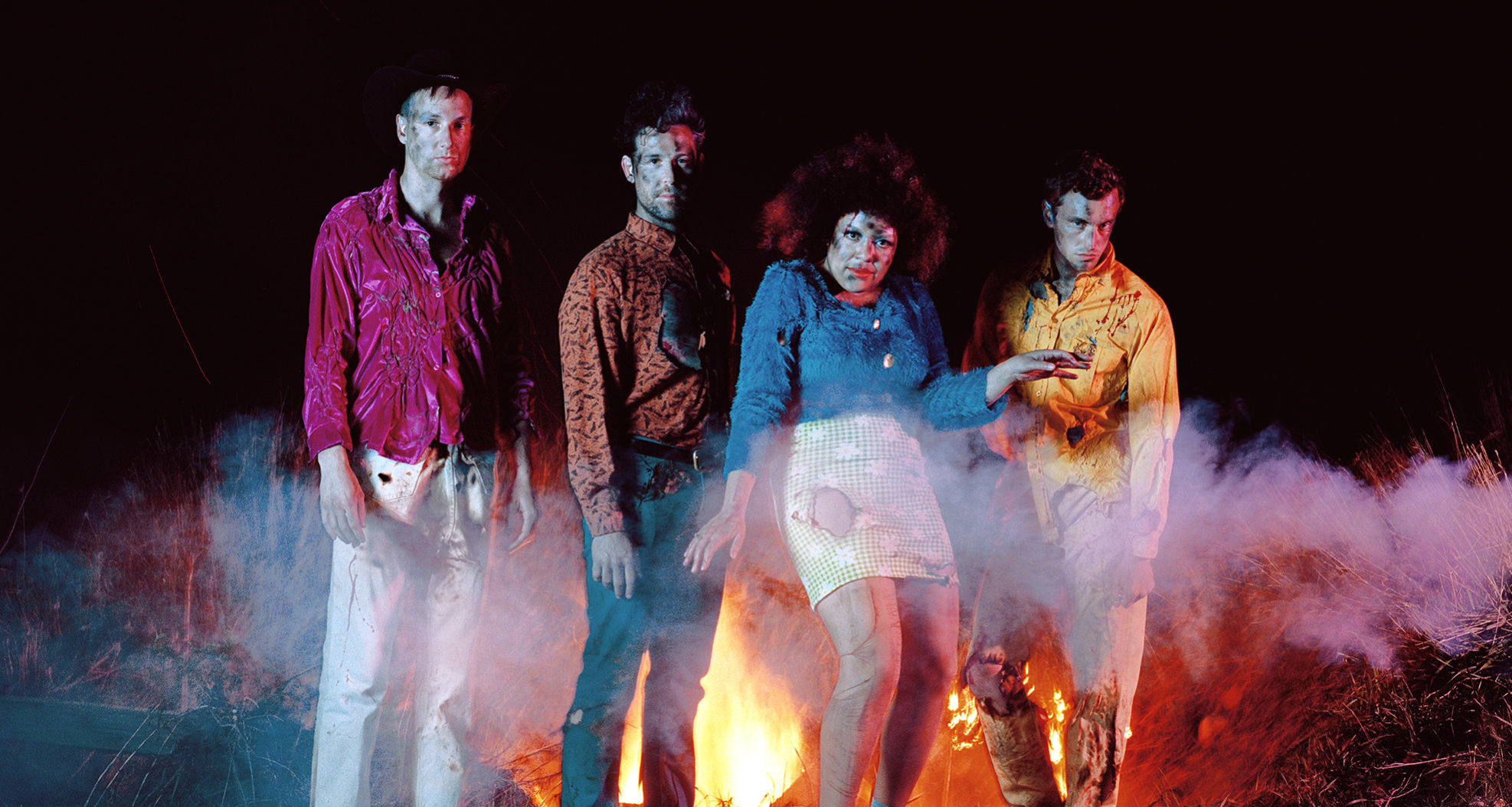Interview: Morgan Waters of Weaves

It’s been a little over a year since Toronto’s Weaves released their debut LP on Buzz Records, rapidly becoming a household name in the Canadian independent music landscape. They have been quick to garner international praise for their brand of unconventional guitar pop with not-so-subtle hints of improvisation. The self-titled effort was largely, considered a great success by music publications far and wide. Their album also scored them a short list nomination for the Polaris Music Prize this year, which they performed at a few weeks back after a year of relentless touring. Let’s just say that this is one band you can’t miss seeing live.
Weaves isn’t kicking back just yet. They have just released their second LP called Wide Open, and are out to prove that there is no obstacle too big for them to scale. Their answer to the challenge of following up a hugely successful debut is to keep creating, and continue to push boundaries wherever possible.Wide Open bounces from calm to chaotic, and pulls listeners in every direction. Early listens from publications like Stereogum indicate that Wide Open will surpass expectations, and even critically out-do their debut. I chatted with founding member of Weaves, Morgan Waters, about their success, their approach to following up their first album, and new steps they’ve taken as a band.
Be sure to catch Weaves on Tuesday, Oct. 10 at House of Targ along with Bonnie Doon and Organ Eyes, presented by Spectrasonic. Tickets are $12.50, more information here.
Interview with Morgan Waters of Weaves
Weaves seems to tread a line between people’s comfort zones. Is keeping listeners on their toes something that comes naturally to the band?
I think with any art you don’t want to be boring. And with us it’s always a mix, we don’t really plan anything out. It’s about showing all the influences crashing up against each other. We want to surprise the listeners, and surprise ourselves. The mix of the artistic and the pop gets thrown into the blender where there’s no genres or anything like that. It’s all fodder for something new.
In what ways did the road and your experiences after the debut release influence songwriting on the new LP Wide Open?
Jasmyn starts everything and it all seems to come from her initial spark. She doesn’t really write anything down, she kind of ruminates about things for a while without telling any of us. It seems to come out of her when she goes to the rehearsal space by herself, recording, looping, figuring things out, and from there it all comes out pretty fast. When she’s in that mode, it’s a quick and fertile ‘brain’ thing going on with her. Then we hear the demos she comes up with and we work on it from there, but within 20 minutes of writing a song the lyrics are all usually there and never change.
You and Jasmyn have an obvious chemistry together in the band. In what ways do you compliment each other as artists?
I think Jasmyn is more impulsive and emotional, and I’m more of an editor. I help present her initial ideas in a way that elevates them. That mix of impulsiveness and my revising or editorial skills kind of complete each other. She loses interest quickly and I never stop obsessing, so we temper each other in that way.
A lot of the time I’m sort of translating her ideas, where I’ll sit there and say what I think will work for whichever project we’re focusing on. I’m very happy to work that way and cycling through the ideas, I have an endless amount of patience. I’ll work hard to try to find the “thing” that clicks for both of us.
Many of us were really excited to see that a collaboration with Tanya Tagaq was included on Wide Open, and the Polaris gala performance of Scream was incredible. How did the partnership come to fruition?
We met Tanya at Iceland Airwaves, on the airplane ride over there. Spencer and Zack kind of knew a few of her band members, and we sort of hit it off the whole weekend. We went to her show, and ever since then we always sort of thought that it would be really great to work with her on something since she takes a very improvisational approach to her music as well, which we’re into. It’s all about capturing a moment, and “Scream” seemed like the perfect song to collaborate with her on.
There is a distinct visual element to Weaves, in things like music videos and album art. What role does visual art and aesthetic play for the band?
It’s a major consideration, but it’s also something that just happens. Similar to our music, we like to leave our videos kind of open so that we can improvise on the day-of. On “Scream” we had a white room studio and a good DP (Director of Photography), so Jasmyn and Tanya were able to move around the space freely. It’s personal expression first, and then concept or theoretical parts are secondary. It’s really about freedom of expression, and that factors into our videos. We shoot stuff and see what happens.
Weaves was shortlisted for the Polaris Music Prize this past year, and there were a lot of incredible artists in the running. What do you think Lido Pimienta’s recent win means for Canadian music?
The best part was that we were given the opportunity to perform live, since playing on stage is where I think we can really stand out. So performing on stage with people like Feist and Lido was a way for us to really show what we’re all about. To us, that was much more important that any sort of competition or win in our books. The concept of “winning” in art is weird. So just the fact that we got to play, and play a new song “Scream” with Tanya was the biggest part for us, really exciting.
I think with Lido’s win, I don’t know if it shows what direction Canadian music is going… I’m not really sure how the voting works and all that. It’s so great that a DIY artist like her can win something like that, and I think that will become the norm as labels keep shutting down and people keep doing things themselves. There are no major label budgets and funding isn’t always there, so artists need to be able to do it themselves. Lido winning shows that you don’t need all that other crap, it’s about the music. It’s about what you have to say. You don’t really need teams if you have the work ethic.
